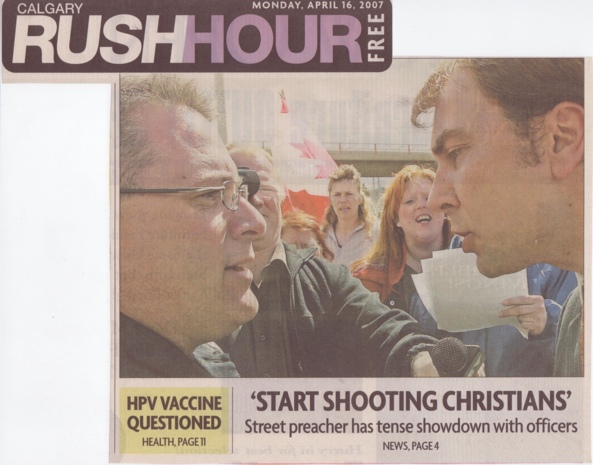Please don’t feed the homeless
Please don’t feed the homeless
Church group lambasted for park program in Abbotsford, B. C.
ABBOTSFORD, B. C. – The Christians and the crack addicts meet for breakfast every Thursday in a downtown park. Church folk offer cold cereal, muffins and coffee. Sometimes, they hand out socks. Drug users mumble their thanks and shuffle off in small groups to park benches and picnic tables, and devour the food.
It is not a happy scene. Sadly, it is too familiar. This could be anywhere in Canada, where church groups are often the agencies of last resort for growing numbers of the homeless, many of whom are drug users. But here in B. C.’s bible belt, feeding the poor and the afflicted is cause for concern.
"The breakfast we help provide is just a simple act of kindness, a way to reach out to people who need help," shrugs Christoph Reiners, pastor of Abbotsford’s Peace Lutheran Church. "Cheerios build relationships."
According to others, Cheerios cause trouble. If some city leaders had their way, Pastor Reiners and his volunteer band of breakfast servers would call it quits, pack up their picnic baskets and get out of Jubilee Park.
The place is overrun with pushers and drug users, to hear these critics tell it. "More drug dealers are being attracted to the park because there are more addicts and homeless coming as a result of these groups giving them free food and clothes," the president of Abbotsford’s Downtown Business Association declared last week.
Robert Bos made the comment after Pastor Reiners was summoned to Abbotsford City Hall, where a trio of municipal councillors pressured him to call off the weekly breakfast outreach.
Senior citizens are scared to use the park, the pastor was told. Citing open drug use, parents will not allow their children to play there anymore.
Pastor Reiners was shocked. He had preached in Winnipeg’s toughest neighbourhoods before moving here five years ago. He thought he was doing a good turn for the community. God’s work.
No one denies that drug use in Jubilee Park was an issue before they began serving breakfasts there. Homeless people had already staked out spots around the park. But the pastor and the breakfast program likely drew more attention to them.
Abbotsford, says the pastor, "is in a bit of denial. People are used to the idea that this is an idyllic small town." An hour’s drive southeast of Vancouver, Abbotsford, with its many churches, has long had a reputation as a Christian centre. Even with its stunning scenery, the mountains and the rich farmland that surround it, it is like any other community in Canada: threatened by drug use and uncomfortable with the rising tide of homeless.
The total number of homeless people in B. C. has been estimated to be 10,000. The problem is especially acute in the province’s Lower Mainland, where the weather is mild enough during the winter that people can survive outdoors.
Figures compiled by a provincial housing agency and published this week by the Vancouver Sun indicate a crisis: Crowded shelters in Metro Vancouver turned away people 40,000 times in an eight-month period last year. Women and children were turned away 16,000 times.
Some travel down the highway and land here, thinking the situation might be better. In fact, it might be even worse, suggests Les Talvio, director of ministries for the Cyrus Centre, a local "inner city mission."
Services are in short supply. Mr. Talvio names a number of shelters and drop-in centres that have closed recently. All of them were within a stone’s toss from Jubilee Park. It’s no surprise that the homeless still gather here.
"This is their turf," Mr. Talvio says.
Mr. Talvio helped initiate the breakfast outreach program last summer. Pastor Reiners and volunteers from Peace Lutheran soon joined in. Despite pressure from City Hall, they have not stopped delivering and serving food. They will not call it quits; they are defiant.
Mr. Talvio was the first to arrive on Thursday this week, at 7:30 in the morning. Pastor Reiners arrived a few minutes later; just behind him were two carloads of church volunteers, most of them seniors.
A dozen scruffy men and women were in the park, waiting. Hardly the hordes that city councillors and Mr. Bos had earlier described. They lined up at the folding tables set up by the volunteers, and received their cups of coffee and bowls of Cheerios.
Some were already high. Kent, 33, is a crack cocaine addict. A native of Williams Lake, in the B. C. interior, he moved to Abbotsford last year to participate in a drug recovery program. Upon completion, he found himself back on the street. Soon he was looking again to score.
"I didn’t need to go into Vancouver," he says. "I found what I was looking for right here. This is a very spiritual centre, with a lot of addiction."
Kent’s hands shake as he talks. His clothes are filthy. He slept the previous night on a piece of cardboard outside an Abbotsford hospital, where he claims he had been denied access.
He says his leg is infected with necrotizing fasciitis, or flesh-eating bacteria. "There’s a lot of that going around right now" he declares. Whatever the problem, the leg is in bad shape. The dressing wrapped around it is stained and oozing pus.
Kent is at rock-bottom. The only thing he had to look forward to this week, he says, was breakfast on Thursday in the park. That, and a few words of encouragement and advice from strangers, the only people in this "spiritual centre" who seem to care.

